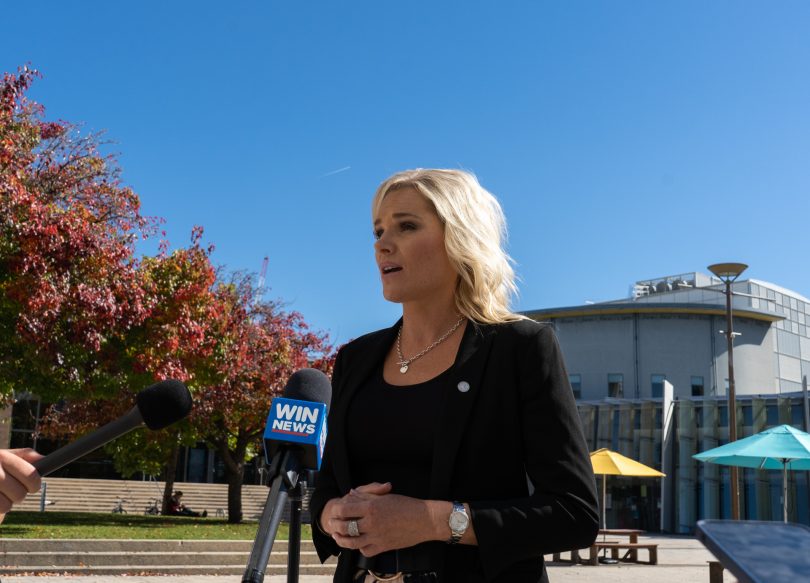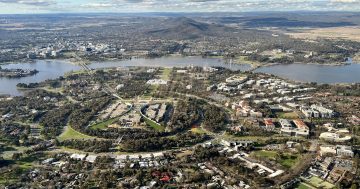
For many Canberra businesses, the last few months haven’t been the ‘v-shaped’ economic recovery they’d hoped for. Photo: Michelle Kroll.
The Opposition says it’s high time the ACT Government released an updated economic recovery plan to show how the Territory will respond to the challenges presented by Omicron and future waves of COVID-19.
Some local businesses say the promised “v-shaped recovery”, which Chief Minister Andrew Barr had repeatedly spoken about through last year’s lockdown, simply hasn’t happened this time.
OTIS Dining Hall owner Damian Brabender said he and other hospitality businesses haven’t seen any evidence of this recovery yet.
Instead, the holiday season was marked by low levels of consumer confidence, staffing shortages and uncertainty.
What Mr Brabender says is missing is targeted messaging about what is safe. He’s worried consumers are now being asked to make too many risk assessments themselves, leading them to stay home and not spend.
Likewise, he’s understanding of general feelings of anxiety, fatigue and uncertainty circling in the population.

OTIS Dining Hall owner and chef Damian Brabender says it’s consumer confidence that is key to economic recovery. Photo: Megan Evans Photography.
Opposition spokesperson for business Leanne Castley largely agrees with this. She wants consumers to be encouraged out and about to spend.
Ms Castley cited the latest CommSec State of the States report and the ABS Labour Force report which show the ACT now has the second-worst performing economy in the nation and the second-highest level of unemployment at 4.5 per cent.
“Consumer spending has not bounced back as the Chief Minister predicted, and the threat of new COVID variants means we will need an economic plan that factors this in,” Ms Castley argued.
Ms Castley said businesses don’t want “handouts”, but they want conditions in place that would let them operate as usual.
But Ms Castley wouldn’t go as far as to say ACT public servants should be required to return to the office to support small businesses such as cafes.
“I’m not here to talk about the public service, I’m here to support business, but I would say to everybody to get out and buy your coffee like you used to.”
Mr Barr has previously said hybrid work will be the future of the ACT public service.

Leanne Castley says people need to get out and spend. Photo: Region Media.
Ms Castley didn’t have a solution to all the problems facing business but implied any remaining restrictions should be lifted and people should be “encouraged out”.
Currently, the only public health restrictions in place in the ACT are classified as “low-level”. There are some density requirements in place, and patrons must wear masks and remain seated while dancing and drinking.
According to a recent survey conducted by the Canberra Business Chamber, 70 per cent of businesses said their situation in January was worse than the previous month and worse than the same time last year.
Canberra Business Chamber CEO Graham Catt said most businesses were dealing with three major issues: a lack of public confidence, ongoing health measures and staff shortages.
Managers of the newly revamped Transit Bar know all about the difficulty of running a business under the current conditions.
While they are up and running now – albeit not at capacity – on the first night they tried to open, a staff member worked while unknowingly COVID-positive, which set them back at the beginning again.
It’s not an uncommon situation either. After staff members became infected, Mr Brabender had to close his restaurant for a whole week.
The difference with the Omicron wave – when compared with previous waves – is the government has not put in place serious public health measures such as lockdowns, and therefore neither federal nor state governments have provided the kinds of financial support that had been delivered in previous lockdowns.
The month of January was also the first time the ACT has experienced real rapid and widespread community transmission of the virus, which businesses then saw reflected in a lack of community confidence in coming out and spending money.
“I think people are fearful, but others have just learned to stay at home, so we need to encourage people to come out to their local pubs and clubs,” Ms Castley said.
The ACT Government has extended the provision of support measures to industry sectors that have been most affected, such as food service businesses and tourism and hospitality. Nightclubs are being provided with specific support.
Mr Barr told the Assembly he is ‘cautiously optimistic’ going into 2022 and that job creation would be a priority. He said the health and economic situation would both be monitored in the coming weeks and more support could be offered if needed.
Business Minister Tara Cheyne strongly rejected Ms Castley’s claim that there had been no increase in spending in the Territory since the ACT emerged from lockdown.
She acknowledged some businesses had shut down in recent weeks and also encouraged Canberrans to spend their money locally, but accused the Opposition of picking and choosing from data sets.














